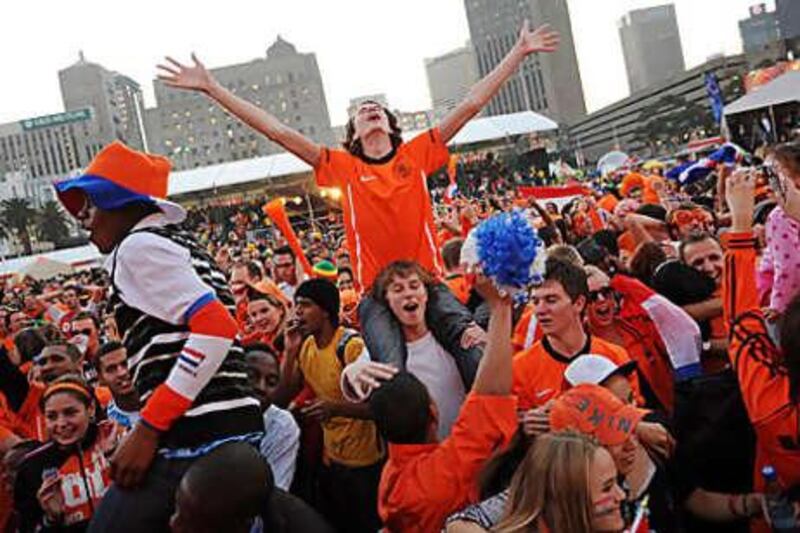CAPE TOWN // The city has turned orange ahead of tonight's semi-final between Holland and Uruguay at Green Point Stadium, but footballing style is not the only reason behind the seemingly collective local decision to back the Dutch. Other motivations, it could be argued, originated nearly three-and-a-half centuries ago.
On April 6, 1652, economic explorer Jan van Riebeeck and his disheveled crew arrived by boat in Cape Town with orders to establish a strategic supply station for the Dutch East India Company's vessels bound for east Africa and Asia. Van Riebeeck's landing prompted the first permanent European settlement in South Africa. And Cape Town, despite being a British colony for much of the period since its European discovery, remains very Dutch.
"The locals have been coming up to us and saying 'you must win, you must win'. That gives us a boost, it is a great feeling knowing the hosts are behind us," said Arien Bomras, from the Dutch city of Eindhoven. He had been in Cape Town for only three hours, but the lasting influence of his forefathers in the area had immediately struck him. "You see straight away that the names of the streets are very Dutch. On the drive from the airport we saw things and we were all saying that they just looked very Dutch, it's hard to explain."
So is the Cape's imperialist history. Colonial struggles for territorial control were followed by discoveries of gold, diamonds, platinum and other mineral resources. The resulting commodity wars saw South Africa's post-Napoleonic British occupiers of the 19th century battle the Zulus and, twice, the Boers, the mostly Dutch farmers who originally settled on the eastern Cape before moving inland to escape the British.
The bloodshed did not end until 100 years ago. Those conflicts, however, were white versus white. It was not until 1990 that Nelson Mandela's 27-year imprisonment on Robben Island, the offshore prison clearly evident from Cape Town's seafront, ended and the wheels of apartheid began falling off. The racial segregation policy evaporated in 1994, when Mandela's ANC party won South Africa's first multiracial elections.
Language is another link with the Dutch. Afrikaans is a watered-down version of Dutch and originates from the 17th century dialect of Van Riebeeck. Historically referred to as Cape Dutch, Afrikaans also borrows from Malay and Portuguese, as well as the tribe tongues of African peoples like the Bantu and Khoi. An estimated 90 to 95 per cent of Afrikaans vocabulary can be traced to Dutch origin. "I'm supporting Holland," said Samuel Jooste, 26, a residential cleaner in Cape Town. "Most South Africans are, the people I know anyway, now that all the African countries are out."
But why not support Uruguay? The South Americans never exploited South Africa. "The Dutch football is pure, it has nothing to do with our history," Jooste said. "Football is about bringing people together and I do not care about what has happened in the past." emegson@thenational.ae





